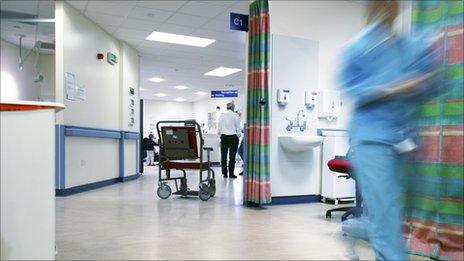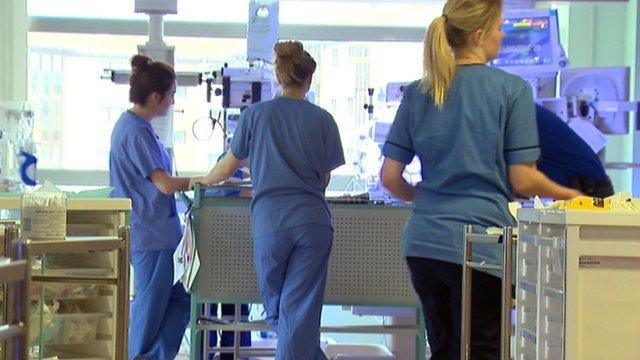NHS in Scotland 'needs former nurses to fill shift gaps'
- Published

Scotland's biggest nursing agency has warned there are not enough qualified nurses in Scotland to fill rota gaps.
ScotNursing, external says it is only able to fill around 40% of available shifts, whereas in the past it was able to fill 90%.
The company is calling on former nurses to consider doing occasional shifts.
The Scottish government said it had taken measures to support nurses, and increase the numbers of nurses and midwives working in the NHS.
ScotNursing chief executive Ann Rushforth said the problem was down to the lack of school leavers joining the profession.
She said: "It takes four years to train a nurse. Sadly school leavers these days don't seem to want to be nurses. They want to be veterinary nurses and supermodels."
Mrs Rushforth urged nurses who are still registered but may have taken a break to have a family or to work in a care home to consider updating their clinical skills.
'Severe shortage'
"People can make a significant difference by doing just one shift a month," she said.
"There are hundreds of vacancies we can't fill but this work still has to be done by someone. People may not realise they're not getting the support they should have."
During the general election campaign, both the Scottish Labour Party, external and the Scottish Conservatives, external promised to employ an extra 1,000 nurses in Scotland. However, Mrs Rushforth said the problem is a severe shortage of qualified staff.
"Nurses are not like instant coffee. You can't just make them. In particular, nurses willing to do occasional shifts have become as rare as pandas."
ScotNursing is in discussion with further education establishments about offering easy routes for nurses to update their skills.
Nurses must work a minimum number of hours per year and have completed appropriate training in order to work in the NHS. ScotNursing said occasional shifts can help them achieve this.
In September last year there were 58,000 nurses and midwives employed in the NHS in Scotland, compared to 55,000 in 2005.
'Under tremendous pressure'
Figures from the NHS statistics department, ISD, external, suggested an extra 429,000 people were seen as inpatients and outpatients over the same period.
This indicates there is only one extra nurse for every 143 attendances.
The Royal College of Nursing (RCN) has warned that health boards are under "tremendous pressure" to fill vacancies, but that staff numbers are failing to keep pace with the increase in patient numbers.
Director of RCN Scotland Theresa Fyffe said: "There is no doubt that there simply aren't enough nurses to fill the gaps.
"This is a result of growing patient demand, significant cuts to the number of nursing students recruited in 2011/12 and 2012/13 and high rates of retirement from the nursing workforce.
"And the withdrawal of return-to-practice programmes over the years makes it difficult for nurses to come back to the workforce. However, where these programmes are still available they are one way of filling these gaps.
"Ultimately, though, what we need is for health boards to robustly apply the nursing and midwifery workforce and workload planning tools. This is the only way in which we will get the right number of nurses with the right skills working in the right places."
'High quality care'
The Scottish government said it was committed to giving nurses the support they need to meet "the increasing demands on the health service".
Health Secretary Shona Robison said: "We have increased the number of nurses and midwives working within the NHS in Scotland by 2,300 during this government, to a new record high level of more than 43,000 WTE qualified nurses and midwives.
"We have recently announced £450,000 funding for a return-to-practice scheme over the next three years, at the same time as a 3% increase in pre-registration student intake which will encourage former nurses and midwives to return to the profession. This scheme will help bring around 75 former healthcare workers back into the profession each year.
"We are also continuing to invest in a range of work to ensure we recruit and retain the right number of staff, and equip them with the skills they need to provide high quality care.
"Through NHS Scotland's ground breaking Nursing Workforce Planning Tools, which were developed in partnership with nurse unions, health boards are able to inform decisions about the number of nurses needed for particular clinical areas."
- Published28 April 2015

- Published21 December 2014

- Published28 June 2011

- Published12 March 2015
